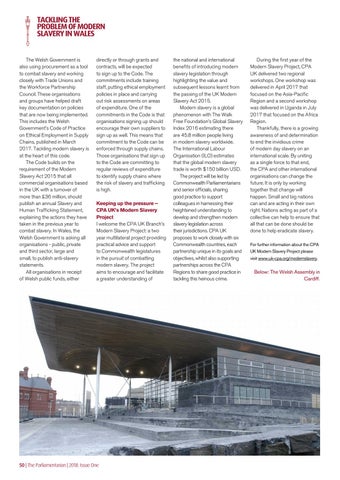TACKLING THE PROBLEM OF MODERN SLAVERY IN WALES The Welsh Government is also using procurement as a tool to combat slavery and working closely with Trade Unions and the Workforce Partnership Council. These organisations and groups have helped draft key documentation on policies that are now being implemented. This includes the Welsh Government’s Code of Practice on Ethical Employment in Supply Chains, published in March 2017. Tackling modern slavery is at the heart of this code. The Code builds on the requirement of the Modern Slavery Act 2015 that all commercial organisations based in the UK with a turnover of more than £36 million, should publish an annual Slavery and Human Trafficking Statement, explaining the actions they have taken in the previous year to combat slavery. In Wales, the Welsh Government is asking all organisations - public, private and third sector, large and small, to publish anti-slavery statements. All organisations in receipt of Welsh public funds, either
directly or through grants and contracts, will be expected to sign up to the Code. The commitments include training staff, putting ethical employment policies in place and carrying out risk assessments on areas of expenditure. One of the commitments in the Code is that organisations signing up should encourage their own suppliers to sign up as well. This means that commitment to the Code can be enforced through supply chains. Those organisations that sign up to the Code are committing to regular reviews of expenditure to identify supply chains where the risk of slavery and trafficking is high. Keeping up the pressure – CPA UK’s Modern Slavery Project I welcome the CPA UK Branch’s Modern Slavery Project: a two year multilateral project providing practical advice and support to Commonwealth legislatures in the pursuit of combatting modern slavery. The project aims to encourage and facilitate a greater understanding of
50 | The Parliamentarian | 2018: Issue One
the national and international benefits of introducing modern slavery legislation through highlighting the value and subsequent lessons learnt from the passing of the UK Modern Slavery Act 2015. Modern slavery is a global phenomenon with The Walk Free Foundation’s Global Slavery Index 2016 estimating there are 45.8 million people living in modern slavery worldwide. The International Labour Organisation (ILO) estimates that the global modern slavery trade is worth $150 billion USD. The project will be led by Commonwealth Parliamentarians and senior officials, sharing good practice to support colleagues in harnessing their heightened understanding to develop and strengthen modern slavery legislation across their jurisdictions. CPA UK proposes to work closely with six Commonwealth countries, each partnership unique in its goals and objectives, whilst also supporting partnerships across the CPA Regions to share good practice in tackling this heinous crime.
During the first year of the Modern Slavery Project, CPA UK delivered two regional workshops. One workshop was delivered in April 2017 that focused on the Asia-Pacific Region and a second workshop was delivered in Uganda in July 2017 that focused on the Africa Region. Thankfully, there is a growing awareness of and determination to end the invidious crime of modern day slavery on an international scale. By uniting as a single force to that end, the CPA and other international organisations can change the future. It is only by working together that change will happen. Small and big nations can and are acting in their own right. Nations acting as part of a collective can help to ensure that all that can be done should be done to help eradicate slavery. For further information about the CPA UK Modern Slavery Project please visit www.uk-cpa.org/modernslavery.
Below: The Welsh Assembly in Cardiff.
